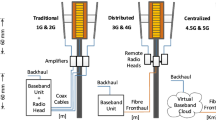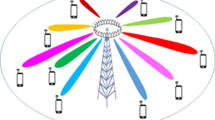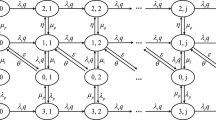Abstract
This paper proposes a novel efficient precoding algorithm to maximize the rate of the cognitive link, where a pair of multiple-input multiple-output cognitive radio users shares the spectrum allocated to multiple primary users as long as the interference power is acceptable. In our method, the precoding vectors are firstly obtained by solving an unconstrained convex problem which is formulated by using the penalty function idea and has a closed-form solution. Then, power is allocated to different precoding vectors to satisfy both the transmit-power constraint and interference-power constraints through interior method. Moreover, an effective set of the penalty weights is presented. Our method has much lower complexity than the optimal solution and similar complexity to other low-complexity methods. Simulation results show that our method significantly outperforms the existing low-complexity methods and has almost the same performance as the optimal solution.




Similar content being viewed by others
References
Mitola, J., & Maguire, J. G. (1999). Cognitive radio: Making software radios more personal. IEEE Personal Communications, 6(4), 13–18.
Haykin, S. (2005). Cognitive radio: Brain-empowered wireless communications. IEEE Journal on Selected Areas in Communications, 23(2), 201–220.
Ji, Z., & Liu, K. J. (2007). Cognitive radios for dynamic spectrum access-dynamic spectrum sharing: A game theoretical overview. IEEE Communications Magazine, 45(5), 88–94.
Niyato, D., & Hossain, E. (2008). Competitive pricing for spectrum sharing in cognitive radio networks: Dynamic game, inefficiency of nash equilibrium, and collusion. IEEE Journal on Selected Areas in Communications, 26(1), 192–202.
Zhang, R., & Liang, Y. C. (2008). Exploiting multi-antennas for opportunistic spectrum sharing in cognitive radio networks. IEEE Journal of Selected Topics in Signal Processing, 2(1), 88–102.
Zheng, G., Ma, S., Wong, K. K., & Ng, T. S. (2010). Robust beamforming in cognitive radio. IEEE Transactions on Wireless Communications, 9(2), 570–576.
Seo, B. (2011). Joint design of precoder and receiver in cognitive radio networks using an MSE criterion. Signal Processing, 91(11), 2623–2629.
Richter, Y., & Bergel, I. (2013). Scaled SLNR precoding for cognitive radio. In Proceedings of IEEE international symposium on personal, indoor, and mobile radio communications (PIMRC) , 2013 (pp. 3011–3015).
Richter, Y., & Bergel, I. (2014). MMSE-SLNR precoding for multi-antenna cognitive radio. IEEE Transactions on Signal Processing, 62(10), 2719–2729.
Sadek, M., Tarighat, A., & Sayed, A. H. (2007). A leakage-based precoding scheme for downlink multi-user MIMO channels. IEEE Transactions on Wireless Communications, 6(5), 1711–1721.
Boyd, S., & Vandenberghe, L. (2004). Convex optimization. Cambridge: Cambridge University Press.
Cover, T., & Thomas, J. (2006). Elements of information theory (2nd ed.). New York: Wiley.
Golub, G. H., & Loan, C. F. V. (1996). Matrix computations (3rd ed.). Baltimore: Johns Hopkins University Press.
Zhang, R. (2010). Cooperitive multi-cell block diagonalizaition with per-base-station power constraints. IEEE Journal on Selected Areas in Communications, 28(9), 1435–1445.
Author information
Authors and Affiliations
Corresponding author
Rights and permissions
About this article
Cite this article
Wang, K., Zhang, B., Wang, X. et al. A Novel Low-Complexity Precoding Algorithm for MIMO Cognitive Radio Systems. Wireless Pers Commun 97, 5077–5088 (2017). https://doi.org/10.1007/s11277-017-4766-2
Published:
Issue Date:
DOI: https://doi.org/10.1007/s11277-017-4766-2




